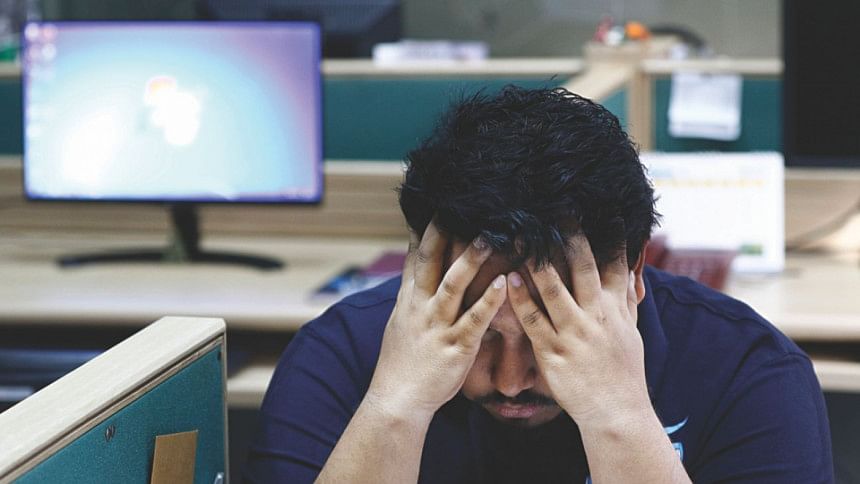Breaking mental health barriers in the workplace

Last week I experienced a tremendous amount of emotional upheaval and mental pressure, finally feeling the brunt of juggling my master's thesis and work. In a moment of weakness, or probably courage to open up about my emotions, I let my supervisor know about my struggles. She suggested that I take a month off from work and come back refreshed. I obviously did a double-take; hardly anyone gets consideration for more than a couple of days for missing work due to physical ailments. And here I was, bewildered that my mental state was given consideration.
Today marks 25 years of celebrating World Mental Health Day. The anniversary is expected to shed some extra light on the day's celebrations, which made it all the more important to choose a theme, as with every year, that would highlight an indispensable concern related to mental health. It was thus decided that the theme would be "Mental Health in the Workplace", which would no doubt seem strange to many Bangladeshis. It isn't that there is anything wrong with the theme, but the very concept of an employee's mental health being given significance would be an alien thought.
Unfortunately, national surveys will not be able to support my assertion since there weren't any conducted regarding a workplace's capacity in promoting good mental health. The only statistic available, a staggering yet neglected one at that, has been oft-repeated over mental health related articles published every few months: According to the National Mental Health Survey conducted by WHO in 2003–2005 about 16.05 percent of the adult population in the country are suffering from mental disorders. ICDDR,B's review in 2014 bumped that number to a prevalence range between 16–31 percent. Regrettably, the inference that can be drawn is that up to 50.5 million Bangladeshis are either unemployed, or are actively hiding their mental illness related issues at work.
National laws are also deprived of any protection for persons with such conditions in their jobs. Bangladesh is continuing to follow the Lunacy Act of 1912. The Mental Health Act 2016 Draft which was slated to be incorporated this year only mentions that companies are to be punished under the Criminal Act, without any guidelines as to the circumstances of the said penalty.
In comparison, Australia, a nation championing the cause of mental health with mental health policies even for companies set in place, has these numbers. One in five Australians (21 percent) have taken time off work in the past 12 months because they felt stressed, anxious, depressed or mentally unhealthy. This resulted in a loss of USD 4.7 billion in absenteeism. From this alone we are able to clearly witness the direct costs of harbouring mental health conditions and the loss ensued if not being treated and given the opportunity to get better.
The notion that a stigma around mental health exists only among the uneducated and poor is broken by the existing practices in our workplaces. In the case of jobs, employees are expected to deliver work based on their skills, rational thinking and capacity to adapt to the demands of their work. If one's mental health related struggles are cited as reasons for being absent or for not completing a task, as opposed to mentioning a physical form of illness, the person's abilities come under doubt. A direct correlation is made between the employee's mental state and their aptitude, or lack thereof.
"I couldn't imagine telling my supervisor that I was unable to take classes due to my bouts of depression," my friend who used to teach at a school two years back and is currently under the care of a clinical psychologist for her depression shares with me. "It wasn't that my condition was perpetually hampering my work. But during the few times that it was, I had to actively mask it and fake having a fever or cold to allow myself some time out. I would come back with a fresh start and make up for lost time. Yet if the depression factor was known, I'd be labelled as incompetent."
Many organisations can easily say that they have not come across any workers having distinct mental health issues. The fact is that an environment driven by lack of information, misinformation and stigma compels workers to actively hide their psychological issues. It would also be too harsh to fully put the blame on the employers. While companies of all shapes and sizes increasingly understand the importance of good mental health compared to the yesteryears, many simply don't feel confident handling and communicating these issues in the workplace. A "don't ask, don't tell" approach to mental disorders becomes the natural state of affairs.
Let alone diagnosed illnesses, direct work-related stress and anxiety are not given any space to be mitigated. Commute within the capital and its outskirts brings with it a constant state of worry of reaching one's destination on time. The cramped cubicle setting of 9-to-5 jobs leaves very little time for relaxation. With the international trend of open workplaces with provisions for gyms, swimming, etc, one will find it difficult to find conservative workplaces having even a break room. Apurba has been diagnosed with obsessive phobia and states, "We don't even have a lunch hour. In between work and meeting, we're told to take 10 minutes out to finish up our lunch. I've skipped them many times since I'd rather put my head down and rest than eat."
While technological advancements have given many the freedom to freelance, the constant connectivity has disallowed employees to leave their work at their work stations. Work hours in many settings extend well beyond 5pm, and even afterwards many have to bring their work home. Saturdays have lost the position as a weekend holiday. Constant communication via emails, Facebook and WhatsApp between managers and workers ensures that no one is able to escape their jobs. Any semblance of a balance between personal and work life becomes non-existent.
Not all has been lost yet. The move of companies adopting the "social enterprise" approach and the rise of youth-led start-ups and organisations have seen a slow yet progressive shift towards adopting a work environment catering to the wellbeing of workers, both physical and mental. Co-working hubs like Moar and InHouse incorporate nature and openness into their office space with greenery and glass fittings to allow a view of the outside. BRAC's Social Innovation Lab situated on the 21st floor seems like an oasis with an open floorplan and arrangements on the balcony for both meeting and taking breaks. "The open environment allows us to communicate better with our colleagues," says Salman Sabbab, iProjects Officer at SIL. "We get to share ideas and build our own, and it helps us be more enthusiastic and productive."
There are many reasons for propagating the need for mental health to be addressed as an issue in the workplace today. A major factor is that many cases go unnoticed until they become severe. While many employers are now geared up to spot signs of physical illness, mental health problems can be more difficult to identify. It's important to safeguard the mental health of the workforce by creating an open and caring culture that makes staff feel supported and looked after.
Bushra Adel is the Programme Director of Identity Inclusion, a programme geared towards countering mental health stigma and promoting community based services and inclusion of people with psychosocial disability.










Comments